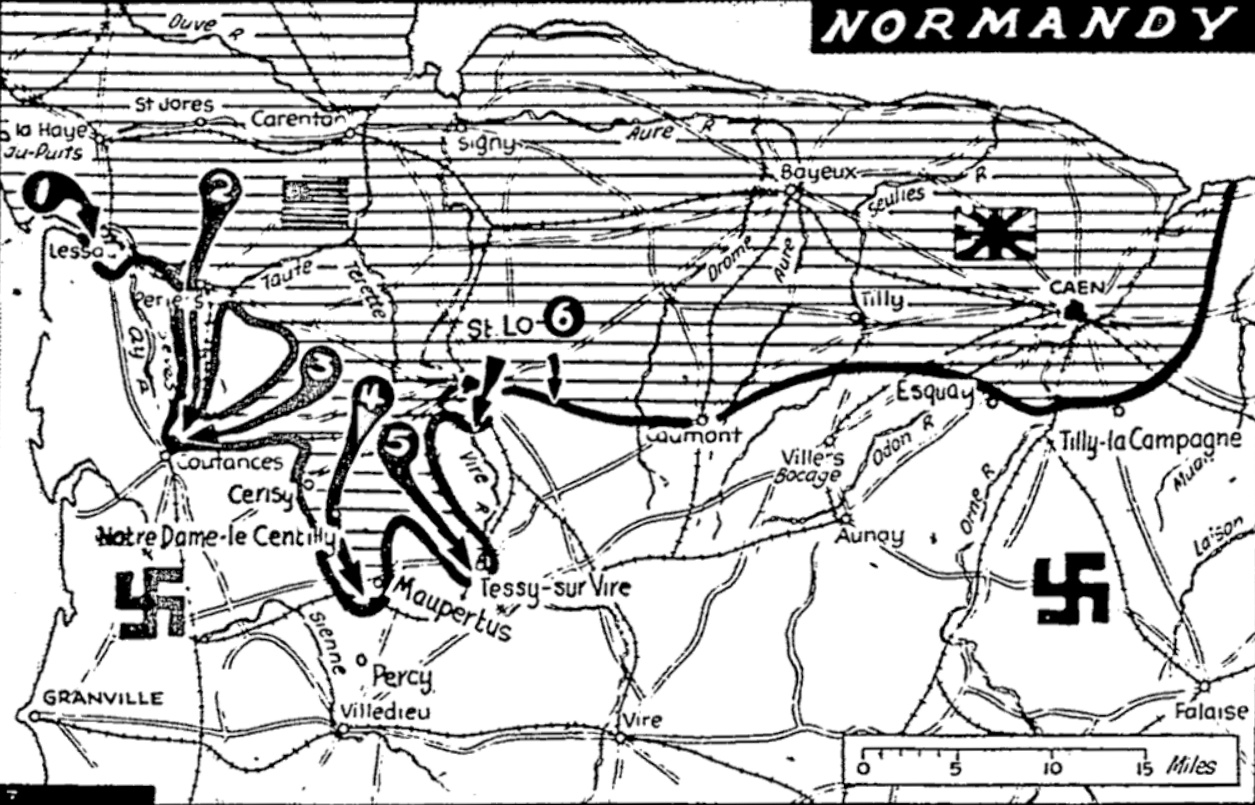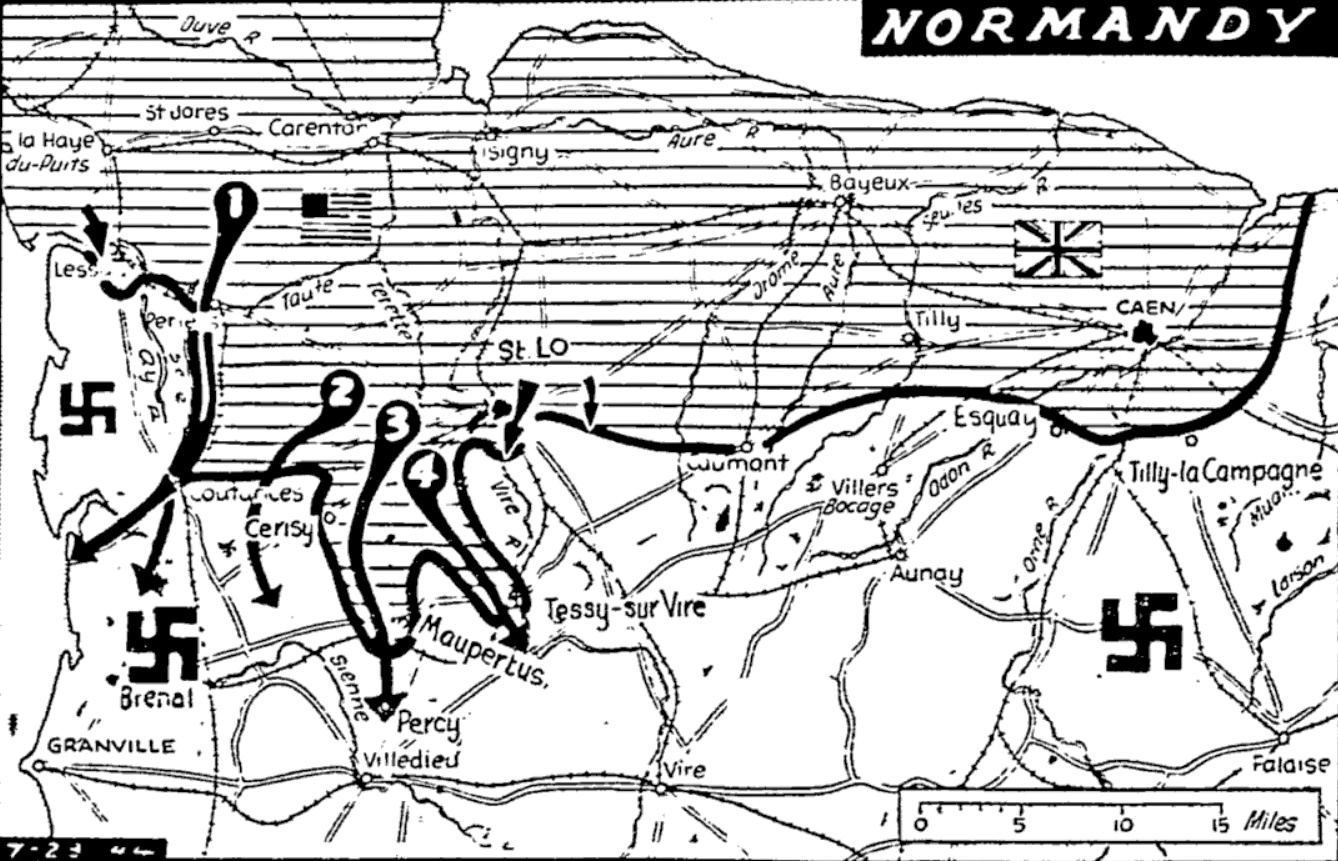Wolfert: Going slowly past fallen comrades, infantry trudges into jaws of death
Each of them knows somebody in crowd will get it, but not him
By Ira Wolfert
With the U.S. infantry west of Saint-Lô, France – (delayed)
The infantry they still say is Queen of Battles. When the infantry wants to cross a road here, it goes like this:
Airplanes and artillery take them by the hand, a big, dull upheaving thump of bombs gets in its way among the bat-like crack of shells, then the infantry grunts itself up onto its two legs and the fellows put their legs in front of them, one after the other and they walk, dragging behind them a train weightier than a train on a queen’s dress. Radio stud and telephone wires, wire layers and spreaders, lance poles, heavier guns, vehicles for all this and for ammunition, rations, ambulances, blood plasma, bulldozers, trucks full of crushed rocks and cots of officers and the typewriters of war correspondents.
The road the fellows went across today was the main road running east from Périers down to Saint-Lô, a hard surfaced country road, twisting and narrow, but first class all the same and the kind a country boy could really spank his auto along. There is a lump of high ground just north of it that the Germans held this morning and then a few miles southeast of it down in that part of the Cherbourg Peninsula they call French Switzerland, there is commanding ground that the Germans hold in force with plenty of howitzers there that can go into the deepest hole after a man and blow him out of there in pieces.
Gray morning at front
It was gray this morning at the front. The infantry and artillery had taken some of the murder out of their promenade and it didn’t look as if the airplanes could work today. Rain which had been dripping down greasily from the skies for days had stopped finally but the sky still hung low and wet-looking over the countryside.
Then the sky began to lift, very slowly, but all in one piece like the curtain of a show and the infantry watched it go up and watched the sun wear at it with its light and heat and wear it thinner and thinner until at last the gray was the color of threadbare cloth and they could see the pale-yellow overlay of the sun through it.
There were miles of people watching in silence the slow inch by inch lift of their ceiling of sky, from 6 o’clock in the morning on. At 6 o’clock, the sky’s ceiling seemed to lay on your face, then at 7 o’clock your face was clear of it and was clinging like with gray fingers to trees and so on and on, lifting higher and higher until at 11:40 the first airplanes came over and the infantry knew for sure that its legs were going to get a workout.
Artillery gets answer
The artillery was pounding good by this time and there was some answer from the Germans. The Nazis were searching the roads and back areas. Searching is a word artillery people like to use but it’s more like clawing. Four of five shells come down on you like a paw and rake you. Then a swift clawing paw rakes alongside of you and in back. It’s a flurry of swift-clawing paws like an animal striking out because you’ve come too close and you hug where you are and stay still and then when its quiet crawl closer. You can’t see the animal and he can’t see you, but there is the feeling in you that you can hear his frightened, dangerous breathing as you crawl closer.
The bombers ran across the sky like girls and vapor blew behind them as if there were skirts blowing in the wind. Then they swooped down and the sound of their bombs dropping all in a packet drummed across the fields and drummed beating wildly up and down the silent country lanes.
Bombs take long time to fall
Flying Fortresses came after them, they sailed with the silvery, gleaming like ships in line each formation of 12 shooting a white smoke flare that dropped the rough skies of foaming yarn. Their bombs took a long time to fall. They came from very high up and the sound of them took a long time to reach us. When it came it was like drumming again, a very wild, drunken, unmusical drumming with an upheaving effect to it like a buried multitude beating up against the surface of the earth. The blasts were ironed out by the two or three miles between us and the bombs so that all they did was to fill our ears a little bit and flap out trousers against our legs.
The infantry now stepped off against the German hedges. They walked erect and they went about a hundred yards every three minutes. There were some fellows killed, a few more wounded but not many.
Pulled our when planes came
Most of the Germans had pulled out when the airplanes came over. They knew we meant business and that arithmetic was against them. They knew that if they stayed, they must inevitably be killed and that was the arithmetic of it. The only thing they could gain by dying was time.
The German command had to decide whether that time was worth buying with the lives of their men there or wherever it would be more useful to pull them out and open a little hole in the line, then ring the hole with big guns and blow men down who ventured into it.
Decide to open hole
The German command decided to open the hole. They made it like a giant maw there and the infantry, knowing exactly what it was, walked steadily into it, going at about 100 yards every three minutes, standing erect and pausing to fire only when fired upon by small arms, not stopping for howitzer shells or mortars but going through the dust and pelting dirt of that opening with white faces and eyes running from side to side as though gripped in their sockets and bodies standing straight up. That part of it at least was the way men would walk.
The queen of battles pulled its train along through the muddy, dirty country lands. You couldn’t see anything of it before the battle, it was hidden in all the fields.
Slowly comes out
Then slowly it began coming out into the lanes, big snorting trucks, spewing squelches of mud from their massive wheels and skittering little jeeps, motorcycles and columns of men stopped under the loads of radios and bundles of wire and heavy mortars and bazookas all covered with green flowering twigs, filling the lanes, coming like a ghost army out of their invisible hiding and going slowly past the dead, looking slowly at the silent wounded coming back, wrinkling their noses over the stink of killed cattle rotting in the fields, watching a wounded cow limp past a herd that had fallen in a row, followed in his limping by a calf that nuzzled her mutely and going along, going along all this time past the broken teeth of the mouth the Germans had opened for them.
Weren’t firing much
Everybody knew he was going into the German mouth. The Germans weren’t firing much today, they were afraid to give away their positions to our artillery planes circling as slowly as falling leaves overhead. But planes come down at night and then the German guns rimming the mouth like jaws will try to clamp down.
The job is to break off those jaws from inside the mouth. The infantry filled the mouth by late this afternoon. They crossed the road and got in beyond in it, then they waited for the jaws to clamp down so that they could break them off there. In the outpost line beyond the infantry those fellows knew that tonight, while the German artillery was firing, German patrols would come out and try to capture some of them so that their intelligence could find out just what kind of an attack this was.
Some will wind up dead
In the moonless darkness tonight, the attempt will surely have some success, some of those fellows out there tonight are going to wind up dead and some are going to become prisoners. There will be German dead too. The outpost sit very quietly in their holes. Each of them knows someone or two or a half dozen of them are not going to be there by the time you read this. Each thinks it’s the other fellow who is going to get it and the Germans assembling for their patrol now somewhere behind the hedges think the same thing. Somebody in the crowd is going to get it but not him.

